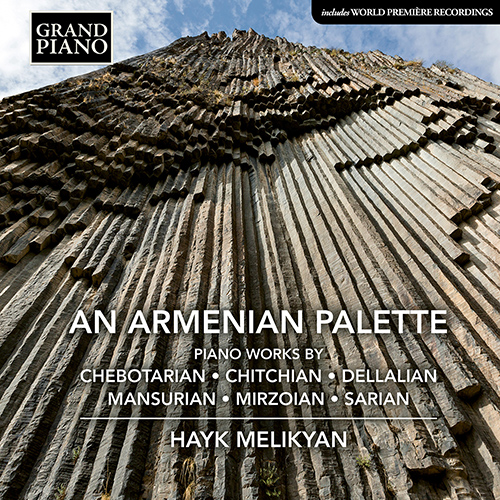
About this Release
“The programme on this album comprehensively encapsulates Armenian 20th century compositional tendencies: national traits, Soviet music traditions, and, of course, personal feelings and disobedience of composers. This album is particularly special since we have featured piano works by Gayane Chebotarian, the first Armenian female composer of the Soviet period, who contributed greatly to the general identity of Armenian music. The piano solo works of two other composers who were part of the Armenian "Mighty Handful" – Sarian and Mirzoian – are also presented in this recording and join my previous two Grand Piano releases (Babadjanian [GP674] and Arutiunian [GP718]). The peak of Avant-Garde traditions is reflected by the work Three Pieces by Tigran Mansurian, the most outstanding living Armenian composer in the world. I had the privilege of performing for the composer in 2009 and learning his own understanding of the Pieces.” — Hayk Melikyan
An Armenian Palette
CHEBOTARIAN • CHITCHIAN • DELLALIAN • MANSURIAN • MIRZOIAN • SARIAN
- Hayk Melikyan, piano
This selection of Armenian piano music reflects the national characteristics, influences and technical developments of its composers over a 70-year period. The colourful dance element spiced with Armenian modes that is so distinctive is contrasted by Tigran Mansurian’s courageous avant-garde Three Pieces from 1971. The Armenian ‘Mighty Handful’ are represented by quintessential works by Mirzoian and Sarian, while several world première recordings expand an appreciation of the national style’s variety and versatility with music couched in ethereal depth and lyric virtuosity.
This recording was made on a modern instrument: Shigeru Kawai Concert Grand
Tracklist
|
Chebotarian, Gayane
|
|
6 Preludes (1948) (00:16:00 )
|
|
1
No. 1. Andante (00:03:33)
|
|
2
No. 2. Allegro grazioso (00:02:02)
|
|
3
No. 3. Adagio con duolo (00:02:24)
|
|
4
No. 4. Allegro grazioso (00:01:44)
|
|
5
No. 5. Andante pastorale (00:04:04)
|
|
6
No. 6. Allegro (00:02:16)
|
|
Saryan, Lazar
|
|
7
Theme and Variations (1947) (00:07:32)
|
|
8
Dance (1955) (00:03:03)
|
|
9
Grandfather's Watch (1972) (00:01:03)
|
|
3 Postludes (1990) (00:06:00 )
|
|
10
No. 1. Maestoso (00:01:50)
|
|
11
No. 2. Andantino recitando (00:02:30)
|
|
12
No. 3. Tempo marciale (00:01:53)
|
|
Mirzoian, Edvard Mik'aeli
|
|
13
Poem (1970) (00:05:58)
|
|
Album for My Granddaughter (1984) (00:13:00 )
|
|
14
I. Morning (00:01:31)
|
|
15
II. Mariam (00:02:02)
|
|
16
III. Meditation (00:03:26)
|
|
17
IV. Play (00:00:56)
|
|
18
V. Sad Waltz (00:03:56)
|
|
19
VI. Toccatina (00:01:22)
|
|
Chitchian, Geghuni
|
|
20
Epitaph (2018) (00:08:21)
|
|
Dellalian, Harutiun
|
|
Piano Sonata, "Dedication to Komitas" (1982) (00:14:00 )
|
|
21
I. Largo e rubato (00:09:14)
|
|
22
II. Allegro (00:04:15)
|
|
Mansuryan, Tigran Yeghiayi
|
|
3 Pieces (1971) (00:08:00 )
|
|
23
No. 1. — (00:04:54)
|
|
24
No. 2. — (00:03:04)
|
|
25
No. 3. Largo (00:02:58)
|
The Artist(s)
The Composer(s)
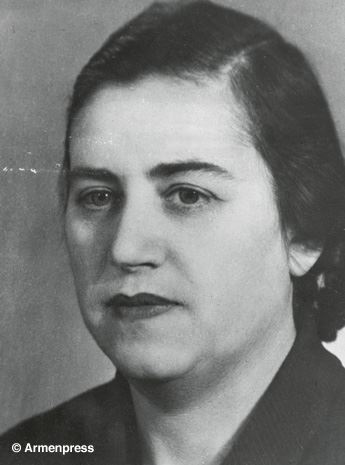 Gayane Chebotarian was born on 8 November 1918 in Rostov-on-Don, Russia, and received her primary musical education at the Rostov Music College. In 1943 she graduated from the composition and piano departments of the Leningrad Conservatory. She became a well-known Armenian pedagogue, teaching at the Yerevan State Conservatory from 1947. In 1956 she was awarded the Medal of Excellence in Labour. She was also awarded the title of Honoured Art Worker of Armenia in 1965. Music for solo piano occupies an important niche in Chebotarian’s oeuvre. She died on 16 January 1998 in Moscow.
Gayane Chebotarian was born on 8 November 1918 in Rostov-on-Don, Russia, and received her primary musical education at the Rostov Music College. In 1943 she graduated from the composition and piano departments of the Leningrad Conservatory. She became a well-known Armenian pedagogue, teaching at the Yerevan State Conservatory from 1947. In 1956 she was awarded the Medal of Excellence in Labour. She was also awarded the title of Honoured Art Worker of Armenia in 1965. Music for solo piano occupies an important niche in Chebotarian’s oeuvre. She died on 16 January 1998 in Moscow. 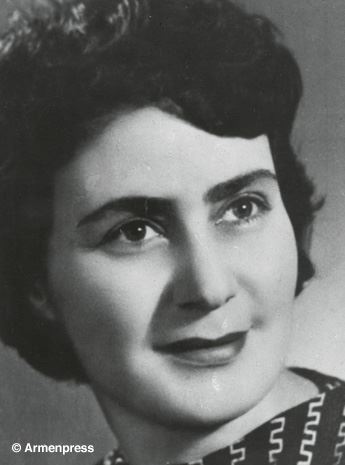 Geghuni Chitchian was born on 30 August 1929 in Leninakan (currently Gyumri), Armenia. In 1953, she graduated from the composition department of the Yerevan State Conservatory (the class of Grigor Yeghiazarian) and received numerous awards and titles. She is a founding member of the Women’s Council of Armenia (1981–2010) and a member the Composers’ Union of Armenia (since 1955), and is also a well-known pedagogue. Chitchian is the author of nine vocal cycles on the lyrics of Armenian poets. She has also composed many romances and songs.
Geghuni Chitchian was born on 30 August 1929 in Leninakan (currently Gyumri), Armenia. In 1953, she graduated from the composition department of the Yerevan State Conservatory (the class of Grigor Yeghiazarian) and received numerous awards and titles. She is a founding member of the Women’s Council of Armenia (1981–2010) and a member the Composers’ Union of Armenia (since 1955), and is also a well-known pedagogue. Chitchian is the author of nine vocal cycles on the lyrics of Armenian poets. She has also composed many romances and songs. 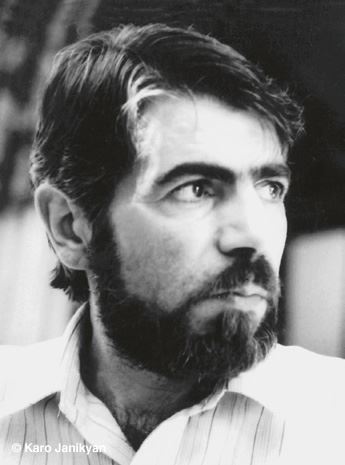 Harutiun Dellalian was born on 8 August 1937 in Athens, Greece. In 1947 he moved to Armenia with his family. In 1972 he graduated from the Romanos Melikian State Music College (class of Edvard Mirzoian), and in 1977 from the Yerevan State Conservatory (class of Eduard Bagdasarian). He received recognition for his Topophono concerto for piano, French horn, and chamber orchestra (1985), which was performed at the Jordan Hall in Boston in 1986 by the Boston Symphony Orchestra, conducted by Aram Gharabekian. The Concerto won the Golden Laurels at the California Film and Television Awards and a ‘Superstar’ Diploma. He died on 23 April 1990 in Yerevan.
Harutiun Dellalian was born on 8 August 1937 in Athens, Greece. In 1947 he moved to Armenia with his family. In 1972 he graduated from the Romanos Melikian State Music College (class of Edvard Mirzoian), and in 1977 from the Yerevan State Conservatory (class of Eduard Bagdasarian). He received recognition for his Topophono concerto for piano, French horn, and chamber orchestra (1985), which was performed at the Jordan Hall in Boston in 1986 by the Boston Symphony Orchestra, conducted by Aram Gharabekian. The Concerto won the Golden Laurels at the California Film and Television Awards and a ‘Superstar’ Diploma. He died on 23 April 1990 in Yerevan. 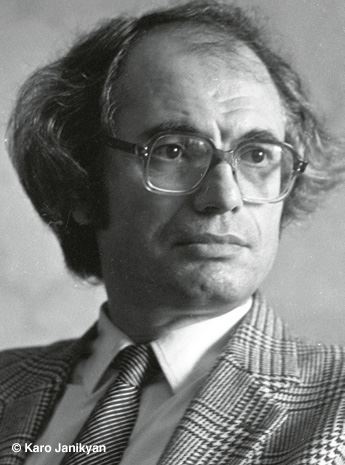 Tigran Mansurian was born on 27 January 1939, in Beirut, Lebanon. In 1947 he moved to Armenia with his family. He studied first at the Romanos Melikian State Music College (class of Eduard Bagdasarian), and in 1965 graduated from the Yerevan State Conservatory (class of Lazar Sarian). He taught modern music theory at the Conservatory from 1967 to 1986. He was the Rector of the Conservatory from 1992 to 1995. He is much lauded in his homeland and around the world, and his Monodia album was nominated for the 2005 GRAMMY Award for Best Instrumental Soloist(s) Performance (with Orchestra) and Best Classical Contemporary Composition.
Tigran Mansurian was born on 27 January 1939, in Beirut, Lebanon. In 1947 he moved to Armenia with his family. He studied first at the Romanos Melikian State Music College (class of Eduard Bagdasarian), and in 1965 graduated from the Yerevan State Conservatory (class of Lazar Sarian). He taught modern music theory at the Conservatory from 1967 to 1986. He was the Rector of the Conservatory from 1992 to 1995. He is much lauded in his homeland and around the world, and his Monodia album was nominated for the 2005 GRAMMY Award for Best Instrumental Soloist(s) Performance (with Orchestra) and Best Classical Contemporary Composition. 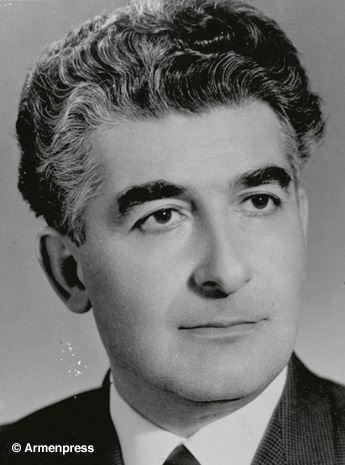 Edvard Mirzoian was born on 12 May 1921 in Gori, Georgia. In 1941, he graduated from the Yerevan State Conservatory in the class of Vardges Talian. During 1946–48 he refined his professional skills at the Music Studio of the Armenian House of Culture in Moscow. Mirzoian is a laureate of several awards, and a representative of the Armenian Mighty Handful. He was President of the Union of Composers of Armenia from 1951 to 1991. Mirzoian was a renowned pedagogue who taught many students including Avet Terterian, Konstantin Orbelian, Jivan Ter-Tadevosian and Robert Amirkhanian, among others. He composed many outstanding works and film scores, and his music received performances by many world-renowned musicians. He died on 10 October 2012 in Yerevan.
Edvard Mirzoian was born on 12 May 1921 in Gori, Georgia. In 1941, he graduated from the Yerevan State Conservatory in the class of Vardges Talian. During 1946–48 he refined his professional skills at the Music Studio of the Armenian House of Culture in Moscow. Mirzoian is a laureate of several awards, and a representative of the Armenian Mighty Handful. He was President of the Union of Composers of Armenia from 1951 to 1991. Mirzoian was a renowned pedagogue who taught many students including Avet Terterian, Konstantin Orbelian, Jivan Ter-Tadevosian and Robert Amirkhanian, among others. He composed many outstanding works and film scores, and his music received performances by many world-renowned musicians. He died on 10 October 2012 in Yerevan. 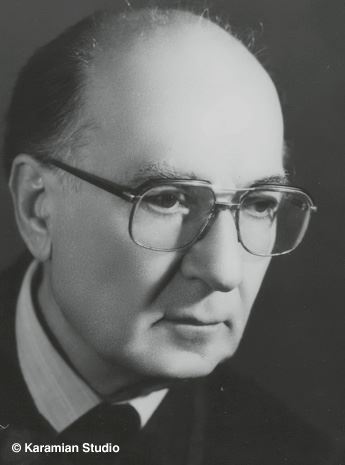 Lazar Sarian was born on 30 September 1920 in New Nakhichevan (now near Rostovon-Don, Russia). He received his primary musical education in a group of gifted children within the Yerevan State Conservatory that included Arno Babadjanian, Alexander Arutiunian and Edvard Mirzoian with whom he would later form the Armenian Mighty Handful. During 1934–38 he studied composition at the Yerevan State Conservatory with Vardges Talian and Sergey Barkhudarian, and in 1939 at the Gnessin State Musical College in Moscow with Vissarion Shebalin. He went on to study at the Moscow State Conservatory, at first with Dmitry Shostakovich (who lavished great praise on his student), but graduated from the class of Dmitry Kabalevsky, since Shostakovich, who was denounced as a formalist in 1948, was deprived of the right to teach. Sarian received several State awards and was a well-known pedagogue, with many composers, including Tigran Mansurian, Stepan Lusikian and Vartan Adjemian, numbered among his students. He died on 27 May 1998 in Yerevan.
Lazar Sarian was born on 30 September 1920 in New Nakhichevan (now near Rostovon-Don, Russia). He received his primary musical education in a group of gifted children within the Yerevan State Conservatory that included Arno Babadjanian, Alexander Arutiunian and Edvard Mirzoian with whom he would later form the Armenian Mighty Handful. During 1934–38 he studied composition at the Yerevan State Conservatory with Vardges Talian and Sergey Barkhudarian, and in 1939 at the Gnessin State Musical College in Moscow with Vissarion Shebalin. He went on to study at the Moscow State Conservatory, at first with Dmitry Shostakovich (who lavished great praise on his student), but graduated from the class of Dmitry Kabalevsky, since Shostakovich, who was denounced as a formalist in 1948, was deprived of the right to teach. Sarian received several State awards and was a well-known pedagogue, with many composers, including Tigran Mansurian, Stepan Lusikian and Vartan Adjemian, numbered among his students. He died on 27 May 1998 in Yerevan. Reviews
“The performances and presentation are beyond reproach. Furthermore, the music is of a very high quality—accessible, but never simple-minded or condescending.” – Fanfare
“Melikyan’s playing is superb and solid, showing that he has wide musical interests. ” – American Record Guide

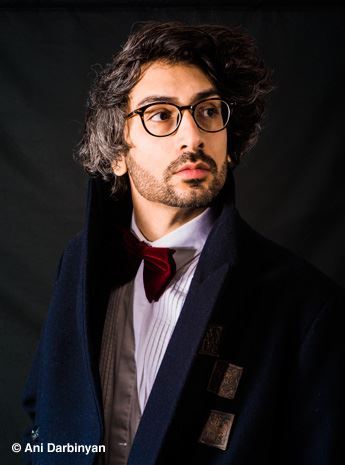
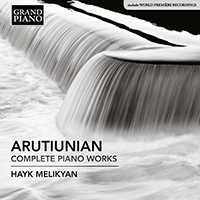
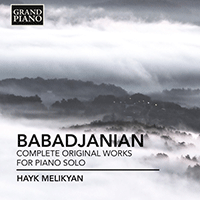
 Grand Piano has gained a reputation for producing high quality recordings of rare keyboard gems. Dedicated to the exploration of undiscovered piano repertoire, the label specialises in complete cycles of piano works by many lesser-known composers, whose output might otherwise have remained unknown and unrecorded.
Grand Piano has gained a reputation for producing high quality recordings of rare keyboard gems. Dedicated to the exploration of undiscovered piano repertoire, the label specialises in complete cycles of piano works by many lesser-known composers, whose output might otherwise have remained unknown and unrecorded.






